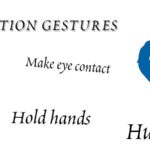
Body language Reconciliation
November 18, 2024
Can People Change?
November 18, 2024IS YOUR BODY LANGUAGE MAKING YOUR ARGUMENTS WORSE?
Body language is an important part of how we communicate.
Here we look at how body language can flame conflict. Look out for our next article where we’ll explain how body language can be used to diffuse an argument.
Every Couple Argues
Ding, ding, ding! That’s an astounding revelation!
Of course you know that. Even Mr Wonderful and Ms Right are going to experience a difference of opinion every now and again. That’s no big deal. In fact, it is healthy.
The only way a couple would never argue is if one person is a complete pushover or is too afraid to state how he or she feels. That person may look calm on the surface but chances are they are a seething mass of resentment underneath — and that’s not a recipe for a happy life.
Keep Conflict from Escalating
So you may not be able to avoid conflict, but you can ensure that arguments don’t get out of hand. Arguments may be inevitable, but you’ll both be happier if they are short-lived and quickly resolved.
One way to do that is by paying attention to your body language.
WHY IS BODY LANGUAGE IMPORTANT?
Body language reveals your emotions. We may say one thing, but if we feel or believe the opposite, our body language gives us away. We know this instinctively. Let’s say you’ve had an argument with your partner. She says sorry, but she’s tapping her foot and looking away. Such an apology would be hard to accept.
Psychologists have found that the way you argue is important. John Gottman conducted a ten-year study on married couples and found that criticism, contempt, defensiveness and stonewalling are particularly unhealthy for relationships. These attitudes can be conveyed in your body language as well.
THE SEVEN DEADLY BODY LANGUAGE SINS
If you want to resolve an argument and keep your relationship happy, it’s wise to avoid gestures that signal contempt or aggression. Here are the worst offenders and why they matter from a body language perspective:
Why is finger pointing problematic from a body language perspective?
Body language experts Allan and Barbara Pease conducted an experiment and found that if a lecturer points his or her finger while teaching a class, students found the lecturer aggressive, unpleasant and belligerent. The students also recalled less information from the lesson. So, if you want your partner to listen to you and feel positive about you, even though you’re arguing, don’t do this. When people point fingers at us, we become distracted because we are sizing them up and judging them instead of listening to what they are saying.
Why are crossed or gripped arms a red flag in conflict?
This is a defensive gesture. We cross our arms across our chest as a barrier when we feel insecure, when we disagree with what’s being said or when we don’t like the person talking to us. Research shows that if you adopt this posture when listening to someone, you remember about 38 percent less information. This isn’t a problem if a boring person at a party traps you, but if you are having an argument with a partner, and want to resolve the problem, you need to listen to what he or she is saying.
If your partner is sitting with arms crossed, try and get them to uncross by taking time out to make him or her a cup of coffee or hand them a glass of water. Not only will they be forced to uncross their arms, but a small act of kindness during an argument will help dissolve the tension too. Just one extra thing – if a person has his arms crossed but both thumbs up, he’s being protective, but he also feels fairly in control of the situation.
Why does crossing both legs and arms signal emotional shutdown?
By adopting this pose, you are literally and figuratively closed off to what your partner is saying.
This closed-off body language in relationships communicates that you are not emotionally available or willing to engage. It’s a subconscious signal that you’re shutting down communication, which can make your partner feel dismissed or rejected. In the context of non-verbal communication during arguments, crossed arms and legs reduce trust and make it harder to reach emotional resolution. If you’re trying to learn how to avoid conflict with your partner, becoming aware of these postures is a powerful first step toward connection and empathy.
Why are clenched fists and crossed arms a warning sign?
This posture shows hostility as well as defensiveness. The person adopting this position looks like he or she is barely containing their temper and might get violent.
This combination is one of the most intense forms of aggressive body language in couples. When a person’s fists are clenched, it not only signals anger but also puts others on alert, often triggering a fight-or-flight response in their partner. In relationship dynamics, this posture can escalate an argument very quickly and make emotional safety feel impossible. Recognizing these signs is key in de-escalating conflict and practicing healthy communication during disagreements.
Why is eye rolling considered destructive body language?
Rolling your eyes to the back of your head suggests you have real contempt for what a person is saying.
Among all negative body language signs in relationships, eye rolling is one of the most toxic. In fact, eye rolling and sarcasm are both strong predictors of relationship dissatisfaction. It signals superiority, disapproval, and emotional detachment. If you’re working on improving communication in marriage or maintaining respectful arguments with your partner, eliminating eye rolling should be a priority. It’s a small gesture, but it can deeply damage emotional intimacy.
Why is swatting someone’s words away harmful in communication?
Like eye rolling, swatting an argument away with your hand suggests you have contempt for your partner’s viewpoint. It’s the body language equivalent of ‘yeah, whatever.’
This dismissive gesture can make your partner feel like their feelings or thoughts are irrelevant. It’s a physical way of saying “your opinion doesn’t matter,” which can seriously harm emotional connection and trust. In the realm of body language in romantic relationships, gestures like swatting are often overlooked, yet they carry a heavy emotional impact. For those seeking to improve emotional intelligence in communication, becoming aware of such subtle cues can lead to deeper, more respectful conversations.
Why is turning your back during an argument a form of stonewalling?
Turning your back on a partner in the middle of an argument is the body language equivalent of stonewalling. You have refused to engage in the discussion.
When emotions are running high, your body language will probably be the last thing on your mind, but it is important. In the next article on body language we will look at reconciliation gestures and give you a suggested pose to adopt when arguing.

